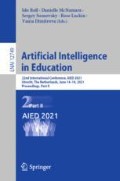Abstract
This paper investigates emerging roles in the context of the community of inquiry model. The paper reports the results of a study that demonstrated the application of epistemic network and clustering analyses to reveal the roles that different students assumed during an asynchronous course with online discussions. The proposed method highlights the differences and similarities between emerging and scripted roles based on the development of social and cognitive presences, two key constructs of the model of communities of inquiry.
Access this chapter
Tax calculation will be finalised at checkout
Purchases are for personal use only
Notes
- 1.
For further details on the course design [10].
References
De Laat, M., Lally, V.: It’s not so easy: researching the complexity of emergent participant roles and awareness in asynchronous networked learning discussions. J. Comput. Assist. Learn. 20(3), 165–171 (2004)
De Wever, B., Van Keer, H., Schellens, T., Valcke, M.: Roles as a structuring tool in online discussion groups: the differential impact of different roles on social knowledge construction. Comput. Hum. Behav. 26(4), 516–523 (2010)
Dowell, N.M., Poquet, O.: SCIP: combining group communication and interpersonal positioning to identify emergent roles in scaled digital environments. Comput. Hum. Behav. 106709 (2021)
Ferreira-Mello, R., André, M., Pinheiro, A., Costa, E., Romero, C.: Text mining in education. Wiley Interdiscip. Rev.: Data Mining Knowl. Disc. 9(6), e1332(2019)
Garrison, D.R.: Thinking Collaboratively: Learning in a Community of Inquiry. Routledge, New York (2016)
Garrison, D.R., Anderson, T., Archer, W.: Critical inquiry in a text-based environment: computer conferencing in higher education. Internet High. Educ. 2(2–3), 87–105 (2000). https://doi.org/10.1016/S1096-7516(00)00016-6
Garrison, D.R., Anderson, T., Archer, W.: Critical thinking, cognitive presence, and computer conferencing in distance education. Am. J. Distance Educ. 15(1), 7–23 (2001). https://doi.org/10.1080/08923640109527071
Garrison, D.R., Anderson, T., Archer, W.: The first decade of the community of inquiry framework: a retrospective. Internet High. Educ. 13(1–2), 5–9 (2010)
Garrison, D.R., Cleveland-Innes, M.: Facilitating cognitive presence in online learning: interaction is not enough. Am. J. Distance Educ. 19(3), 133–148 (2005)
Gašević, D., Adesope, O., Joksimović, S., Kovanović, V.: Externally-facilitated regulation scaffolding and role assignment to develop cognitive presence in asynchronous online discussions. Internet High. Educ. 24, 53–65 (2015)
Hamerly, G., Elkan, C.: Learning the k in k-means. Adv. Neural Inf. Process. Syst. 16, 281–288 (2004)
Joksimović, S., Gašević, D., Kovanović, V., Adesope, O., Hatala, M.: Psychological characteristics in cognitive presence of communities of inquiry: a linguistic analysis of online discussions. Internet High. Educ. 22, 1–10 (2014)
Kovanović, V., Gašević, D., Joksimović, S., Hatala, M., Adesope, O.: Analytics of communities of inquiry: effects of learning technology use on cognitive presence in asynchronous online discussions. Internet High. Educ. 27, 74–89 (2015)
Kovanović, V., et al.: Examining communities of inquiry in massive open online courses: the role of study strategies. Internet High. Educ. 40, 20–43 (2019)
Mayordomo, R.M., Onrubia, J.: Work coordination and collaborative knowledge construction in a small group collaborative virtual task. Internet High. Educ. 25, 96–104 (2015)
Ferreira Mello, R., Gašević, D.: What is the effect of a dominant code in an epistemic network analysis? In: Eagan, B., Misfeldt, M., Siebert-Evenstone, A. (eds.) ICQE 2019. CCIS, vol. 1112, pp. 66–76. Springer, Cham (2019). https://doi.org/10.1007/978-3-030-33232-7_6
Näykki, P., Isohätälä, J., Järvelä, S., Pöysä-Tarhonen, J., Häkkinen, P.: Facilitating socio-cognitive and socio-emotional monitoring in collaborative learning with a regulation macro script-an exploratory study. Int. J. Comput.-Supported Collab. Learn. 12(3), 251–279 (2017)
Pozzi, F.: The impact of scripted roles on online collaborative learning processes. Int. J. Comput.-Supported Collab. Learn. 6(3), 471–484 (2011)
Rolim, V., Ferreira, R., Lins, R.D., Gǎsević, D.: A network-based analytic approach to uncovering the relationship between social and cognitive presences in communities of inquiry. Internet High. Educ. 42, 53–65 (2019)
Shaffer, D.W.: Epistemic Frames and islands of expertise: learning from infusion experiences. In: Proceedings of the 6th International Conference on Learning Sciences, ICLS 2004, pp. 473–480. International Society of the Learning Sciences, Santa Monica, California (2004). http://dl.acm.org/citation.cfm?id=1149126.1149184
Shaffer, D.W., et al.: Epistemic network analysis: a prototype for 21st-century assessment of learning. Int. J. Learn. Med. 1(2) (2009)
Starczewski, A., Krzyżak, A.: Performance evaluation of the silhouette index. In: Rutkowski, L., Korytkowski, M., Scherer, R., Tadeusiewicz, R., Zadeh, L.A., Zurada, J.M. (eds.) ICAISC 2015. LNCS (LNAI), vol. 9120, pp. 49–58. Springer, Cham (2015). https://doi.org/10.1007/978-3-319-19369-4_5
Strijbos, J.W., Weinberger, A.: Emerging and scripted roles in computer-supported collaborative learning. Comput. Hum. Behav. 26(4), 491–494 (2010)
Thomas, J.: Exploring the use of asynchronous online discussion in health care education: a literature review. Comput. Educ. 69, 199–215 (2013)
Wise, A.F., Chiu, M.M.: The impact of rotating summarizing roles in online discussions: effects on learners’ listening behaviors during and subsequent to role assignment. Comput. Hum. Behav. 38, 261–271 (2014)
Xu, R., Wunsch, D.: Clustering, vol. 10. John Wiley (2008)
Author information
Authors and Affiliations
Corresponding author
Editor information
Editors and Affiliations
Rights and permissions
Copyright information
© 2021 Springer Nature Switzerland AG
About this paper
Cite this paper
Ferreira, M., Mello, R.F., Lins, R.D., Gašević, D. (2021). Analytics of Emerging and Scripted Roles in Online Discussions: An Epistemic Network Analysis Approach. In: Roll, I., McNamara, D., Sosnovsky, S., Luckin, R., Dimitrova, V. (eds) Artificial Intelligence in Education. AIED 2021. Lecture Notes in Computer Science(), vol 12749. Springer, Cham. https://doi.org/10.1007/978-3-030-78270-2_28
Download citation
DOI: https://doi.org/10.1007/978-3-030-78270-2_28
Published:
Publisher Name: Springer, Cham
Print ISBN: 978-3-030-78269-6
Online ISBN: 978-3-030-78270-2
eBook Packages: Computer ScienceComputer Science (R0)

